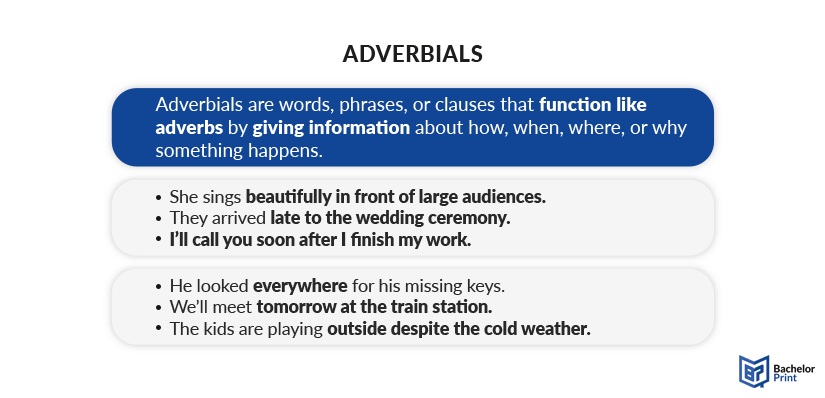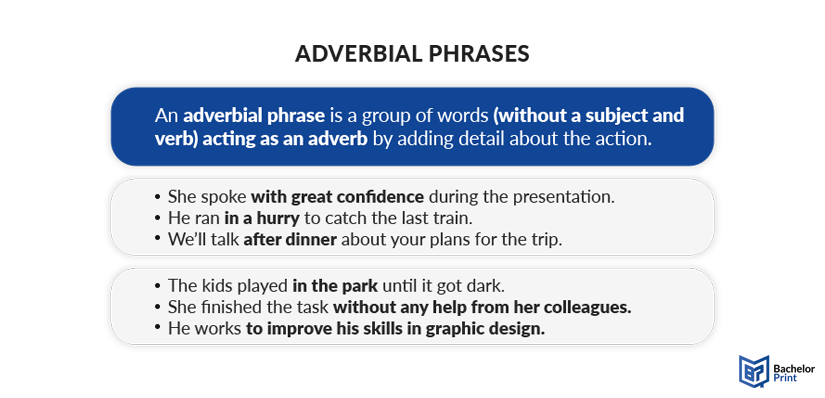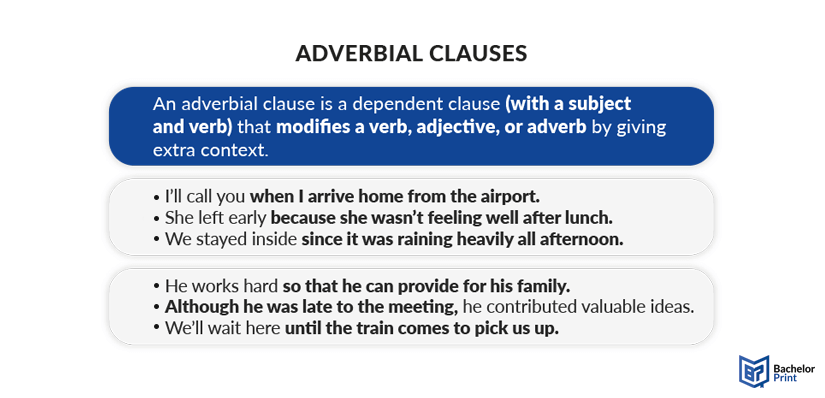
An adverbial is a term used in both general and academic writing to describe a word that can modify an adjective, verb, or entire sentence. It may take the form of an individual word, clause, or phrase and can be positioned in various places within a sentence. Similar to adverbs, adverbials are utilized to explain place, manner, and time. In this article, we’ll dive deeper into this subject.
Definition: Adverbials
An adverbial works as any word, phrase, or clause that modifies the meaning of a verb, adjective, or another adverb. Adverbials provide additional information about how, when, where, why, or to what extent something happens. Essentially, adverbials tell us more about the action in the sentence or the characteristics of an adjective/adverb.
- Adverbial phrases modify the main clause of a sentence by providing further information that clarifies or intensifies the meaning of the verb, adjective, or adverb.
- Adverbial clauses have a subject and verb and are connected to the main clause by conjunctions to add further context to the action, e.g., purpose or reason.

Adverbials as phrases
Adverbial phrases are groups of words that function together as an adverb. They modify a verb, an adjective, or even an entire clause by adding information about manner, time, place, reason, or degree. Unlike adverbial clauses, adverbial phrases don’t contain a subject and a verb.
Other types of adverbial phrases
Other types of adverbial phrases are: the prepositional phrase, infinitive phrase, and adverbials with intensifiers. Each one will be explained below.
A prepositional phrase usually starts with a preposition and acts like an adverb by providing more information about…
- when
- where
- how
…something is happening. It modifies the verb in the sentence.
An infinitive phrase begins with an infinitive verb (to + verb). These phrases can function as adverbials by explaining the…
- goal
- purpose
- reason
…behind an action.
An adverbial phrase can be intensified by words like “very,” “extremely,” or “quite.” These intensifiers change the degree of the action being described by the verb or adjective.

Adverbials as clauses
An adverbial clause is a group of words with its own subject and verb that functions like an adverb. It modifies a verb, an adjective, or another adverb by providing extra details, such as time, reason, condition, or manner.
Since it’s a dependent clause, an adverbial clause cannot stand alone as a complete sentence. Instead, it enriches the main clause by adding context that a single adverb often cannot.

Placement
Adverbials can be placed anywhere in a sentence. For instance, they can come before or after a verb, and you can have multiple adverbials in a sentence. You can determine the placement of adverbial clauses or phrases based on where you want to place emphasis.
Fronted adverbials are, as the name suggests, at the beginning of a sentence, followed by a comma. However, you can also use adverbials at the end of the sentence without a comma.
When placing an adverbial clause in the middle, use commas to separate the clause.
When placing an adverbial phrase or clause in a sentence, ensure the punctuation is correct to avoid a change in meaning. For instance, a misplaced modifier can misrepresent a sentence.
The first sentence suggests that Sheila worked out in the office, whereas the second example is clearer.
numerous advantages for Canadian students:
- ✓ 3D live preview of your configuration
- ✓ Free express delivery for every order
- ✓ High-quality bindings with individual embossing

Examples
Below, you can find numerous adverbial examples.
Examples
Examples
In the tables below, we show examples more for each function of adverbial phrases and clauses.
| Adverbial phrase | Example |
|---|---|
| Manner | He would always talk in a whisper. |
| Time | After the game, the team will review their performance. |
| Purpose | He visited the island to find gold. |
| Place | The thief stabbed Jason in the back. |
| Adverbial clause | Example |
|---|---|
| Manner | Mary gave her speech exactly as she had practiced in the mirror. |
| Place | Rose said the fight broke out at the dance theatre. |
| Reason | Jason is amazing at billiards since he worked in a pool hall. |
| Time | The girls assembled and prepared for the march as the band played. |
| Purpose | The students were reading all night to pass the test. |
| Comparison | Felix is nearly as talented at lifting as he is at swimming. |
| Contrast | Although 20 people applied for the job, they hired the first interviewee. |
List
The download box below includes a list of adverbials.
FAQs
An adverbial is any word, phrase, or clause that functions like an adverb. For example:
- She spoke with confidence.
Here, “with confidence” is an adverbial phrase that tells us how she spoke.
An adverbial is just a part of a sentence that gives extra details about how, when, where, or why something happens. It can be a single word (quickly), a phrase (in the morning), or a clause (because it was raining).
Front adverbial are adverbials placed at the start of a sentence.
- In the morning, we went jogging.
- After dinner, she called her friend.
- On the weekend, they played soccer.
- Because it was snowing, we stayed inside.
- Without hesitation, he accepted the offer.
- Across the street, a parade was marching.
- Before sunrise, the birds began to sing.
- During the winter, many animals hibernate.
- Although he was tired, he kept working.
- At the top of the hill, the view was stunning.